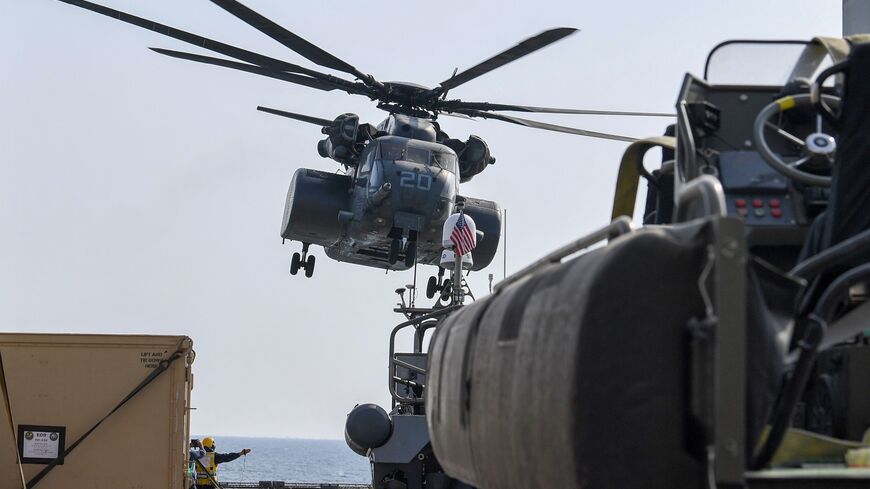WASHINGTON — US CENTCOM became the first geographic combatant command to hire a tech industry veteran to serve in a top advisory role on artificial intelligence Wednesday as the Pentagon strives to maintain a technological edge over China.
Andrew Moore, a former top AI executive at Google Cloud and dean of computer science at Carnegie Mellon University, will also advise CENTCOM’s headquarters at MacDill Air Force Base in Tampa, Florida, on machine learning, cloud computing, data analytics and robotics.
“Dr. Andrew Moore brings a level of expertise in AI that is unparalleled,” CENTCOM commander Michael Kurilla said Wednesday. “He is a titanic figure in all the areas in which we plan to expand CENTCOM.”
Moore’s hiring marks a win for the military’s relations with Silicon Valley as the Pentagon has struggled to scout talent in recent years in the wake of public controversies over the ethical dilemmas posed by autonomous systems in warfare.
He joins a growing roster of civilian officials brought on over the past year and a half to guide CENTCOM’s new high-tech task forces as they experiment with emerging systems and AI integration.
“I don't know if it's possible to overstate how important it is to have technical talent available to the department and how challenging we have found it at times to do so,” Schuyler Moore (no relation), who joined CENTCOM last year as its first chief technology officer, told reporters on Tuesday.
Yet it won’t be Andrew Moore’s first glimpse into the Pentagon’s modernization bureaucracy. The former Google Cloud exec previously served on the US National Security Commission on Artificial Intelligence alongside former Google CEO Eric Schmidt after being nominated to the role by former US Defense Secretay James Mattis.
“The United States government is not prepared to defend the United States in the coming artificial intelligence era,” the body concluded in its final recommendation report in 2021.
“Our armed forces’ competitive military-technical advantage could be lost within the next decade if they do not accelerate the adoption of AI across their missions,” the document read.
“This will require marrying top-down leadership with bottom-up innovation to put operationally-relevant AI applications into place.”
Moore is expected to face just that at CENTCOM. The first step, Schuyler Moore said, will be to bring him out to US bases in the Middle East to familiarize him with the command's experimental initiatives.
“There are projects that we suspect he will have a lot of inputs on, both related to data structuring and preparing ourselves for digital warfare at headquarters, to computer algorithms and AI adaptation out in theater,” she told reporters.
Theory and practice
Likely atop Andrew Moore’s agenda is getting to know the Navy’s experimental Task Force 59, based in Bahrain.
Task Force 59 began experimenting with techniques to pair commercially available unmanned seafaring vessels with manned ships in 2021, with the goal of exponentially expanding the US Fifth Fleet’s awareness of what’s going on in the waterways of the Middle East.
Speaking to Al-Monitor in a recent interview, Kurilla revealed he wants to take those methods even further.
During the US-led International Maritime Exercise (IMX) in March, the Fifth Fleet partnered with the Royal Saudi Navy on naval demining exercises and incorporated autonomous surface, sub-surface and airborne drones.
“Think of the ability to create a self-healing mesh data network where you're expanding this bubble around all your ships,” Kurilla explained to Al-Monitor.
That enabled sailors to expand the range from which they could neutralize naval mines from the typical seven nautical miles to 25, the CENTCOM commander said.
“By doing that, you’re taking the human out of the minefield,” Kurilla noted.
Pentagon planners have long been wary that in the event of regional conflict involving Tehran, Iran may litter the Strait of Hormuz and possibly the mouth of the Red Sea with naval mines. Such a move could take the US Navy some time to clean up, threatening to dent the global economy.
Kurilla suggested that it’s too early for the exercises to begin chipping away at projected timelines in CENTCOM’s naval demining operational planning. “We’re still kind of in the experimentation phase,” he explained.
But he suggested the command’s drive toward a proverbial “single pane of glass” — or shared situational awareness with regional militaries — is within reach.
The general said that using an array of unmanned sensors already deployed in the Arab Gulf during IMX, “We were able to produce an unclassified [common operational picture] to push back out to partners and the TF 59 robotics operations center.”
During another exercise under IMX, CENTCOM officials took data gathered by the unmanned sensors and "pushed it to each one of the countries individually without aggregating that at [Fifth Fleet headquarters] before we did that, so everybody could see the exact same thing,” Kurilla said.
CENTCOM also plans to harness AI to coordinate air defenses to thwart future complex attacks involving Iran’s drones.
But not all the high-flying ideas emerging from the command are necessarily defensive.
CENTCOM’s regular JADC2-focused “Digital Falcon” exercises aim to speed up what senior military officials say is a time-consuming process of identifying and teeing up targets — specifically dynamic targets, or ones not initially planned, that may emerge on an active battlefield during a major confrontation, such as with Iran or its proxies.
Like the Scarlet Dragon exercise series, which Kurilla led at the helm of the Army’s XVIII Airborne Corps before taking charge at CENTCOM, Digital Falcon utilizes Project Maven, an artificial intelligence platform developed by the Pentagon in 2017 capable of sifting through thousands of hours of drone footage to automatically identify potential targets in a fraction of the time.
Kurilla, a veteran JSOC task force commander, emerged as an early advocate of Maven while commander of the 82nd Airborne Division during its deployments in Afghanistan, Iraq and Syria in 2016-18.
Within a year of its creation in 2017, Maven had already been fielded in the Middle East.
“There was no way we’re going back after this,” retired US Air Force Lt. Gen. Jack Shanahan, who until directed the Pentagon’s Joint Artificial Intelligence Center from its inception in 2018 until 2020, recalled to Al-Monitor.
“That was the original Maven, which was still not perfect. But it was a technology that showed what can be done,” Shanahan said.
By this summer’s Digital Falcon exercise, Kurilla wants Maven to develop and process up to 1,000 dynamic targets per day and upload them to a tactical data network.
“We're already seen an exponential improvement in our targeting since we started this six months ago, and we believe we'll be able to reach or exceed our 1,000-dynamic-targets-a-day goal by June of this year,” Kurilla told Al-Monitor.
Defense officials have said AI-assisted targeting does not remove humans from decisions to launch strikes.
"For strike and kinetic action, we will always have a human making that decision," Schuyler Moore told reporters in December.
AI, she said, "informs the decision-making to the extent that it helps you filter down the context, but there will always be a layer of human decision-making on top of that.”
CENTCOM has been incorporating takeaways from its exercises in the Pentagon’s regular JADC2-focused Global Information Dominance Experiments, which CENTCOM is expected to have its turn to lead in the coming months.
The command's new AI adviser will play a key role in bringing in live data from the Middle East for those events, Schuyler Moore told reporters on Tuesday.
“We have really good mechanisms in place to implement AI and machine learning and we're already doing it in a number of operational environments,” she said.
“We really have an urgency to innovate,” Kurilla told Al-Monitor.
“We want to be an experimentation center for new ideas and technology solutions, not [only] for CENTCOM, but also for DOD problems,” he said.
“We think we’ve got a pretty harsh environment [in the Middle East so] if it works here, it'll work elsewhere,” the general explained.
“These are the things we always wanted to do,” Shanahan said of CENTCOM’s initiatives, “but the innovation was never, ever going to come from the Pentagon.”








